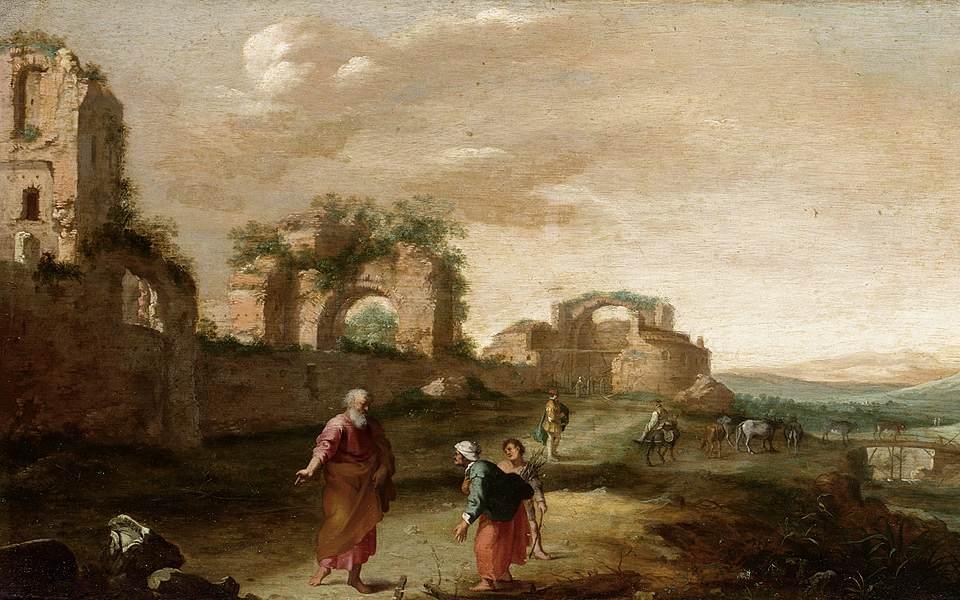"Let’s look at the revelation from God...it is all about crossing religious boundary lines."

All Saints Episcopal Church, Beverly Hills, California - November 11, 2018
1 Kings 17:8-16 (and Mark 12:38-44)
Today, all over the world, in Roman Catholic churches, Lutheran churches, Presbyterian churches, Episcopal/Anglican churches and many others, the same lessons are read. So on this day, hundreds of millions of people will hear the amazing, almost fanciful, story of a prophet and a widow. The prophet’s name was Elijah, but the widow’s name was never mentioned. Today, I would like to preach about this unnamed woman who lived a marginal life, in a backwater place. And yet, almost 3,000 years later, on this Sunday, the world is still hearing about her.
In the Middle East, in her day, a severe drought lingered for many years, and people were dying daily. As a matter of fact, this widow walked out of the gates of her city to gather a few sticks to make a cooking fire. She intended to use the last of her oil and meal to have something to eat before she and her son would die of hunger as others around her were doing.
With the sticks in her hands, and just as she was ready to go back through the gates of her pagan city, a newly-arrived foreigner, named Elijah, confronted her. He audaciously said, “Bring me a little water. . . that I may drink.” And to top that, he yelled after her and added, “Bring me a morsel of bread in your hand.”
"If you were that widow, what would you have said to Elijah? Probably not a church kind of comment."
If you were that widow, what would you have said to Elijah? Probably not a church kind of comment. Her immediate response was probably written all over her face. Because before she could speak, Elijah quickly said, “Don’t be afraid. Here is the deal. If you empty your jar of meal and empty your jug of oil, make some tiny cakes, and then give me the first cake, then you and your son will not die. You and your son will live. As a matter of fact, for the rest of this drought, your jar and your jug will never be empty.”
The widow and the prophet bargaining at the gates of the city almost 3,000 years ago! The prophet was promising a miracle, and the widow was carrying a revelation from God that has remained hidden for thousands of years. (Until revealed today at All Saints Episcopal Church, Beverly Hills, California, Breaking biblical news!)
"Let’s look at the revelation from God that has remained hidden for thousands of years. It is all about crossing religious boundary lines."
First, let’s look at the miracle! I think that the prophet Elijah just didn’t want to be in a strange land, but God made him go there. So Elijah was edgy and obnoxious. But the widow wasn’t backing down. She sensed extra dimensions were at play. Her miracle was that she gave from her thirst, gave from her hunger, gave when giving made no human sense. Only God sense! What breaks the drought and the famine is her willingness to empty her jug and her jar and herself just before dying. She sensed that nothing was going to change unless she trusted the power of giving her life away. Once the prophet saw the faith of this pagan, he, too, began to live into the miracle. “Deep calls to deep!”
Next, let’s look at the revelation from God that has remained hidden for thousands of years. It is all about crossing religious boundary lines. Elijah was Jewish, lived in Israel and worshipped Yahweh. The widow lived on the other side of the border in a country called Sidon where the people worshipped the god, Baal. Followers of Yahweh and the followers of Baals despised and killed each other for years.
Nevertheless, our story says that God commanded Elijah to cross the border of Israel and live in the country of Sidon. And a widow of Sidon was chosen, by God, to feed Elijah during the drought. The prophet and the widow started the interfaith movement there almost 3,000 years ago. The widow didn’t convert. The prophet didn’t convert. They trusted in the workings of God which were beyond them both. It was a miracle that people of two warring religions figured out how to depend on each other and get through the drought together.
And here is an addition worth noting: soon after the drought, the widow’s son died. And the widow lashed a hard lament in the direction of Elijah. She was saying that the death of her only child, her son, should not be accepted by Elijah and herself. Beyond the realm of the Jewish God, beyond the realm of the god Baal, far higher where God is not religious and only is God. Couldn’t an appeal be made to an ultimate dimension. I can hear her saying to Elijah, “Look here, with my faith and your connections, we could enter a future realm right now.” Tales of life after death had been circulating for centuries and in many cultures. But the widow screamed at the prophet for the next life, now, not later. She was saying, “Come on, Elijah, breath heavy and push. It’s time for resurrection birth. Now!”
Upon which, Elijah prayed to God entreating, “O Lord my God, let this child’s life come into him again.” And you know what happened to this boy of another faith? He came back to life. 800 years before Easter Sunday in Jerusalem, the Bible’s first resurrection took place in Sidon, with a prophet who crossed a religious boundary and to an unnamed widow who lived an interfaith miracle.